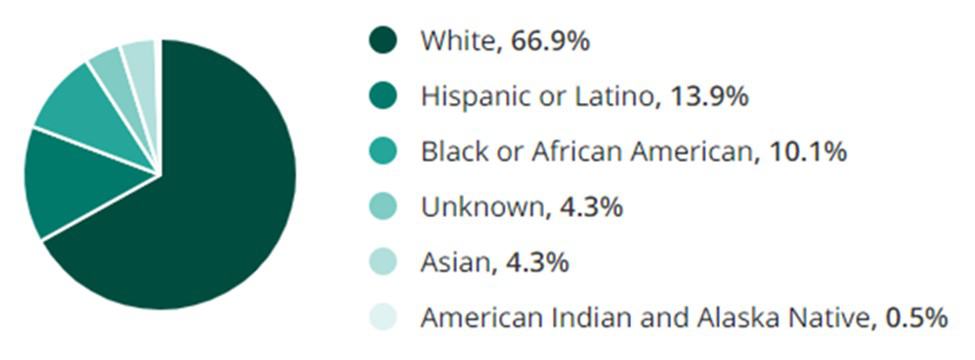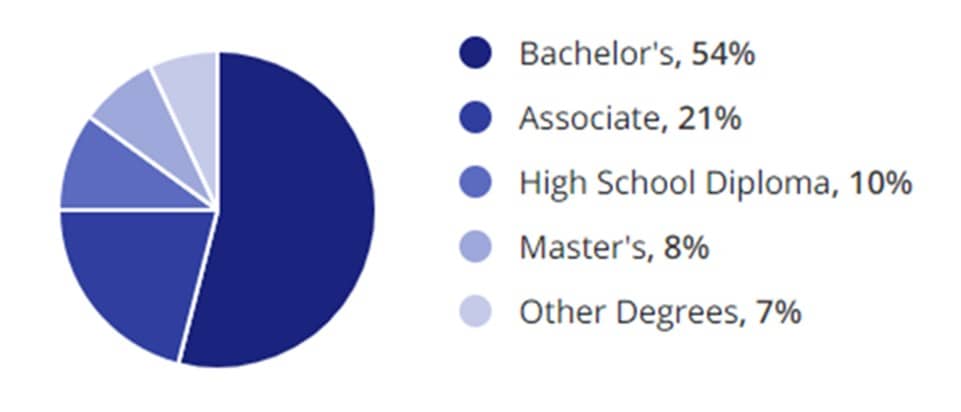Welcome to the ultimate guide for launching and advancing your career in Cleaning or Facilities Jobs. Explore the field of Cleaning or Facilities Jobs in this guide, whether you’re starting out or looking to expand your career. You’ll find everything from educational paths and critical skills to industry trends and salary insights. Cleaning or Facilities Jobs are more than just maintaining buildings—it’s about ensuring comfort, safety, and efficiency for everyone within the built environment. Besides, it’s a career where diversity and inclusivity are crucial in driving innovation and operational success. If you want to make a meaningful impact in your workplace and beyond, you’re in the right place. Let’s explore what the world of Cleaning or Facilities Jobs has to offer you.
Educational Requirements
Launching a career in facilities management typically requires a mix of education and hands-on experience. Educational pathways vary widely. Some professionals start with a high school diploma, gaining expertise through extensive on-the-job training. Others pursue higher education, securing degrees in facilities management or related areas.
Many opt for certifications that demonstrate their skills and commitment to the field. Two well-recognized credentials include the Certified Educational Facilities Professional (CEFP) and Facility Management Professional (FMP) certifications. These are available through respected organizations such as APPA and IFMA, which offer detailed programs for aspiring facilities professionals to stand out.
Certifications like these bolster your resume and ensure you’re up-to-date with the latest practices in facilities management jobs. They testify to your expertise and dedication, making you a highly sought-after candidate in a competitive market. The right blend of education and certification can set you apart whether you’re eyeing facilities director jobs or entry-level positions.
Areas of Expertise
The field of facilities management is diverse, covering various roles that focus on keeping properties safe, functional, and efficient. Here’s a glimpse into some key areas of expertise:
- Sustainability and Energy Management: This area emphasizes eco-friendly practices to promote energy efficiency across facilities. It aligns with global efforts to reduce carbon footprints and sustainably manage resources.
- Project Management: Professionals here oversee new construction or renovation projects from inception to completion. They ensure projects meet deadlines, budgets, and quality standards.
- Operations and Maintenance: This role is crucial for the day-to-day running of facilities. It involves routine maintenance to ensure all systems operate smoothly, promoting safety and comfort for occupants.
- Real Estate: In this specialization, you manage the organization’s property assets, including buying, selling, and leasing commercial spaces.
- Emergency Preparedness and Business Continuity: This sector focuses on preparing plans to keep operations running during unexpected crises, protecting assets and people.
Finding your niche in cleaning or facilities jobs can be a rewarding path that offers variety and the chance to make a significant impact. Whether your interest lies in ensuring energy efficiency or maintaining property safety, there’s a specialization for you. You can excel in any of these areas with the proper training and certifications, contributing to modern workspaces’ smooth operation and sustainability.
Demographics in the United States
The diversity of the workforce within Cleaning or Facilities Jobs reflects the broader societal demographics of the United States. By understanding the characteristics of those employed in this sector, we gain insights into its inclusiveness and the opportunities it offers to various groups.
Ethnicity/Race:
The ethnic composition of the facilities workforce is broad, highlighting a step towards more inclusive employment practices. Here’s a quick look at the estimated distribution:
- White: 66.9%
- Hispanic or Latino: 13.9%
- Black or African American: 10.1%
- Asian: 4.3%
- Unknown: 4.3%
- Native American and Alaska Native: 0.5%
This diversity is critical for bringing various perspectives and ideas to the table, which fosters innovation and growth within organizations.

Gender:
While the gender division in Cleaning or Facilities Jobs has traditionally seen a male majority, the landscape is slowly changing:
- Male: 76.9%
- Female: 23.1%
Efforts are ongoing to balance this disparity with initiatives to encourage more women to pursue careers in facilities management and ensure they have access to leadership roles.

Age:
The facilities sector attracts a diverse range of age groups, reflecting its appeal to both experienced professionals and those entering the workforce:
- Estimated average age: Over 40 years
Younger professionals often introduce new technologies and innovative methods, while their more experienced counterparts contribute depth in maintenance, operations, and management. This blend of fresh ideas and seasoned wisdom enriches the field, driving excellence and efficiency.

Salary Trends
Salaries in Cleaning or Facilities Jobs vary based on factors such as job role, geographical location, and level of responsibility. However, professionals in this sector can anticipate a range of compensation that reflects the importance and complexity of their work.
On average, facilities managers in the U.S. can expect to see salaries that span from $50,000 to $120,000 annually. This range captures entry-level positions to those requiring extensive experience and specialization. Positions such as facilities VP or facilities supervisor in larger organizations or high-cost living areas often command the higher end of this spectrum.
Specialized roles, including sustainability coordinators or emergency preparedness directors, might see variations in compensation due to the niche skills and certifications required. It’s also noted that achieving recognized certifications, such as those offered by APPA and IFMA, can significantly influence salary expectations by highlighting an individual’s expertise and dedication to the field.
Considering the growing complexity of facilities management, ranging from maintaining safety standards to incorporating sustainability practices, professionals equipped with the latest skills and knowledge are positioned to command competitive salaries. The salary trends in the sector reflect the evolving nature of the job, the increasing demand for specialized expertise, and the critical role facilities professionals play in the operational success of organizations.
Hiring Trends
The demand for skilled professionals in Cleaning or Facilities Jobs is seeing a significant uptick. This upward trend is driven by the growing emphasis on sustainable and efficient building operations and the technological advancements in managing modern workspaces.
An estimated growth rate of 6% over the next five years highlights the increasing need for facilities professionals. This aligns with the broader focus on optimizing physical spaces to reduce operational costs while ensuring a safe, comfortable environment for occupants.
The expansion of the sector is creating opportunities across various specialties, including:
- Energy management, due to the push for more eco-friendly and cost-effective buildings.
- Technology implementation is mainly for intelligent building systems that automate heating, cooling, and lighting controls.
- Emergency preparedness, with an emphasis on maintaining business continuity in the face of unforeseen events.
Moreover, the rising interest in improving workspace design to enhance employee well-being and productivity fuels demand for innovative facilities solutions. Employers seek candidates with the technical competencies and a strategic mindset to effectively manage and evolve facilities operations.
For those looking to enter or advance in the field of facilities management, staying informed about industry trends and developing relevant skills are vital to leveraging the growing opportunities in this dynamic profession.
Education Levels
Facilities management has seen a shift towards higher education as a standard requirement for many roles. This evolution mirrors the increasing complexity and strategic importance of managing modern work environments. Here’s an overview of the education levels typically found among professionals in Cleaning or Facilities Jobs:
- High School Diploma: Entry-level positions may only require a high school diploma and on-the-job training to equip employees with the basic skills.
- Associate’s Degree: Some technical roles within facilities may benefit from an associate’s degree in a related field, providing a foundation in maintenance and operations.
- Bachelor’s Degree: A bachelor’s degree in facilities management or a related area is increasingly becoming a minimal requirement for many mid-level to senior roles. This level of education offers a broader understanding of business operations, project management, and strategic planning, which is crucial for managing complex facilities operations.
- Advanced Degrees: Professionals seeking leadership positions or specialized roles in sustainability or real estate might pursue master’s degrees or higher. Advanced degrees can offer deeper insights into the intricacies of facilities management, including advanced project management, legal issues, and technology integration.
- Certifications: Beyond traditional degree programs, certifications like the Certified Educational Facilities Professional (CEFP) and Facility Management Professional (FMP) are highly regarded in the industry. These credentials signify a professional’s expertise and commitment to continuous learning in facilities management.
As the facilities field grows in sophistication, the educational backdrop of its workforce becomes more diverse. Persisting in personal and professional development through formal education and industry certifications sets the groundwork for a successful career in facilities management.

Skills in Demand
The facilities management landscape is ever-evolving, prompted by technological advances, sustainability practices, and workplace design. As a result, the skill set required for professionals in Cleaning or Facilities Jobs is also changing. Here are some of the most sought-after skills in the industry:
- Technical proficiency: Understanding the mechanics of building systems (HVAC, electrical, plumbing) is foundational. Being able to diagnose and troubleshoot issues is critical.
- Project management: Successfully overseeing projects, from minor renovations to significant constructions, demands strong organizational skills, budgeting, and timeline management.
- Environmental stewardship: With a surge in demand for green buildings, skills in energy management and sustainability practices are increasingly valuable.
- Safety and compliance: Ensuring workplace safety and adherence to regulatory requirements is a non-negotiable aspect of facilities management.
- Strategic planning: The ability to align facilities operations with the broader organizational strategy is essential for senior roles.
- Technology adoption: Familiarity with the latest tech trends, including automation and intelligent building technologies, places professionals at the forefront of the industry.
- Communication and leadership: Effective communication and team leadership are vital, especially for managerial positions overseeing diverse teams.
These skills enhance a professional’s ability to perform their role effectively and contribute significantly to the organization’s operational efficiency and strategic goals. Developing these competencies can dramatically boost your career prospects, whether just starting or aiming to climb higher in the facilities management ladder.
Current & Future Cleaning or Facilities Jobs Outlook
The job outlook for professionals in Cleaning or Facilities Jobs remains exceptionally promising. Driven by ongoing trends in environmental sustainability, technology integration, and workplace efficiency, the demand for skilled facilities personnel is set to grow. Here’s a closer look at what the future holds for this dynamic field:
Continued Growth:
The sector is expected to see a steady increase in opportunities, with a projected growth rate of 6% over the next few years. This rise reflects facilities managers’ critical role in organizations’ operational efficiency and sustainability.
Shift Towards Sustainability:
There’s a growing emphasis on green building practices and energy management, creating a surge in demand for professionals skilled in these areas. To remain competitive, facilities managers must stay abreast of the latest eco-friendly technologies and sustainability standards.
Technological Advancements:
The rise of intelligent buildings and the Internet of Things (IoT) in facilities management is reshaping the profession. Future facilities managers will require proficiency in integrating and managing these technologies to optimize building operations and enhance occupant comfort.
Increased Focus on Well-being:
Organizations are increasingly recognizing the impact of the physical work environment on employee well-being and productivity. Facilities professionals skilled in designing and maintaining spaces that promote health, safety, and well-being will be in high demand.
As the facilities management field evolves, staying informed about industry trends and upskilling accordingly will be vital to seizing the numerous opportunities ahead. The future is bright for those ready to embrace the exciting changes shaping Cleaning or Facilities Jobs, from sustainability initiatives to tech-driven efficiencies.
FAQ’s
What qualifications do I need to work in Cleaning or Facilities Jobs?
To start a career in facilities management, you might need a combination of education and hands-on experience. This can range from a high school diploma and extensive on-the-job training to higher education degrees. Certifications such as the Certified Educational Facilities Professional (CEFP) and Facility Management Professional (FMP) can also enhance your qualifications.
Are Cleaning or Facilities Jobs in demand?
Yes, a growing demand for skilled facilities professionals is driven by an emphasis on sustainable building operations, technological advancements, and efficient workspace management. This trend is expected to continue, projecting a healthy job outlook for the sector.
What areas of expertise are there in facilities management?
Facilities management encompasses several specializations, including energy management, project management, operations and maintenance, real estate, emergency preparedness, and business continuity. Each area offers unique challenges and opportunities for professionals.
How can I advance my career in facilities management?
Advancing your career in facilities management can involve gaining additional certifications, pursuing higher education, and developing in-demand skills such as project management, sustainability practices, and technological proficiency. Staying abreast of industry trends and networking within professional communities is crucial.
What is the salary range for Cleaning or Facilities Jobs?
The salary for facilities management roles can vary widely, with factors such as job role, experience level, and location coming into play. Generally, wages in the U.S. range from $50,000 to $120,000, with those in specialized or senior positions commanding higher salaries.
Additional Resources
For those looking to dive deeper into a career in facilities management, numerous resources are available to enrich your knowledge and skills. Here are some valuable links:
- APPA Certification – Certified Educational Facilities Professional (CEFP): Offers comprehensive programs for aspiring facilities professionals.
- Facility Management Professional (FMP): A well-regarded certification that signifies expertise in the field.
- CareerOneStop: A resource sponsored by the U.S. Department of Labor, providing career advice, training programs, and job search resources.
Exploring these resources can provide a strong foundation as you advance your facilities career. From gaining industry-recognized certifications to exploring the various facets of facility management, the journey to becoming a proficient facilities professional is enriching and rewarding.
Conclusion
In summary, pursuing a career in Cleaning or Facilities Jobs offers a wide array of opportunities and challenges. Demand for skilled, certified professionals in sustainability, technology, and workplace well-being is on the rise. Whether you are just starting your diversity job search or are looking to advance your career, the path in facility management is ripe with possibilities for innovation, growth, and making a significant contribution to organizational success.
As the industry continues to evolve, staying informed and connected is critical. We invite you to become part of Diversity Employment—a platform committed to fostering a diverse and inclusive workplace. Join us to explore our resources and job listings and connect with a network of diverse professionals and employers. By sharing knowledge and experiences, we can all contribute to shaping a more inclusive future in facilities management.




